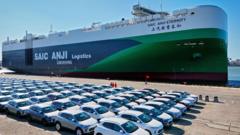Windsor, Ontario, faces potential turmoil as President-elect Trump's 25% tariff on Canadian imports threatens the city's auto industry, essential for its economic survival.
The Precarious Future of Windsor's Auto Industry Amid Tariff Threats

The Precarious Future of Windsor's Auto Industry Amid Tariff Threats
Growing concerns loom over the impact of proposed tariffs from President-elect Trump on Canada's automotive heartland.
In Windsor, Ontario—a city closely linked with the automotive sector and located just across the Detroit River from the U.S.—an air of uncertainty hangs heavy as local businesses brace for potential tariffs announced by President-elect Donald J. Trump. His threat to impose a steep 25 percent duty on all Canadian imports has sent ripples of concern through Windsor, which is home to the Stellantis assembly plant and other vital auto parts manufacturers.
The Lanex Manufacturing plant, operating since 1988, is one such enterprise feeling the strain. The factory has played a vital role in producing components for vehicles ranging from high-end Corvettes to family-friendly Honda minivans. “Everybody’s waiting for the next shoe to drop,” warned Bruce Lane, the company president. The specter of tariffs looms large; if they come to fruition, Windsor's automotive business—its economic lifeline—could face devastation.
Prime Minister Justin Trudeau, visiting Windsor, acknowledged the community's precarious position. “These workers here in Windsor are more exposed to trade with the United States than anyone else,” he observed during his tour of a local steel plant. The close-knit economic ties between Canada and the U.S., particularly regarding auto manufacturing, put Windsor directly in the crosshairs of proposed U.S. trade policies.
“The integration of our economies through the automotive industry has been deep-rooted, and any disruption could lead to significant ramifications,” said an industry analyst. With the city’s fate intimately tied to the changes in U.S. trade policy, Windsor’s residents and businesses find themselves anxiously awaiting the unfolding of a potentially tumultuous future.
The Lanex Manufacturing plant, operating since 1988, is one such enterprise feeling the strain. The factory has played a vital role in producing components for vehicles ranging from high-end Corvettes to family-friendly Honda minivans. “Everybody’s waiting for the next shoe to drop,” warned Bruce Lane, the company president. The specter of tariffs looms large; if they come to fruition, Windsor's automotive business—its economic lifeline—could face devastation.
Prime Minister Justin Trudeau, visiting Windsor, acknowledged the community's precarious position. “These workers here in Windsor are more exposed to trade with the United States than anyone else,” he observed during his tour of a local steel plant. The close-knit economic ties between Canada and the U.S., particularly regarding auto manufacturing, put Windsor directly in the crosshairs of proposed U.S. trade policies.
“The integration of our economies through the automotive industry has been deep-rooted, and any disruption could lead to significant ramifications,” said an industry analyst. With the city’s fate intimately tied to the changes in U.S. trade policy, Windsor’s residents and businesses find themselves anxiously awaiting the unfolding of a potentially tumultuous future.






















